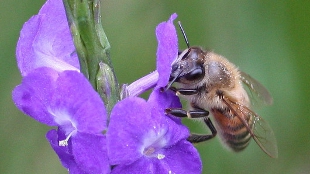 FLICKR, MONICA R.The European Commission (EC) will severely restrict the use of the neonicotinoid pesticides blamed by some researchers for the widespread collapse of bee populations. A fierce debate over the role the chemicals continues among researchers, lawmakers, and industry, but for the next 2 years, the EC will take a precautionary approach, it announced yesterday (April 29).
FLICKR, MONICA R.The European Commission (EC) will severely restrict the use of the neonicotinoid pesticides blamed by some researchers for the widespread collapse of bee populations. A fierce debate over the role the chemicals continues among researchers, lawmakers, and industry, but for the next 2 years, the EC will take a precautionary approach, it announced yesterday (April 29).
Bees pollinate roughly a third of the world’s food crops, so mass die-offs of bee colonies around the globe are a matter for grave concern. A growing body of research suggests that neonicotinoids, used since the 1990s to protect crops from insect pests, might be harming bees exposed to nectar and pollen in flowers that have absorbed the chemicals from the soil.
But pesticide manufacturers, farmers, and other scientists argue that most of the studies have been conducted in the lab and do not reflect field conditions, and that the evidence that neonicotinoids are killing bees is far from conclusive.
In January this year, the EC proposed a 2-year ban on the pesticides in areas where they might affect bees. In March, the proposal did ...




















